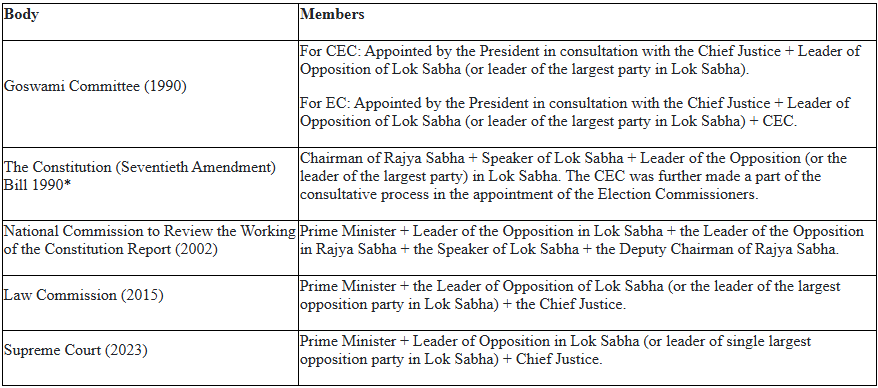Syllabus: GS2/Polity and Governance
Context
- President Droupadi Murmu appointed Gyanesh Kumar as the chief election commissioner of India under the Chief Election Commissioner and Other Election Commissioner Act, 2023.
About
- This 2023 Act replaces the Election Commission (Conditions of Service of Election Commissioners and Transaction of Business) Act, 1991, introducing significant changes to enhance the autonomy and functioning of the Election Commission of India (ECI).
- The CEC name was recommended by a three-member committee comprising:
- Prime Minister of India (Chairperson),
- Union Home Minister (Cabinet Minister nominated by the PM).
- Leader of Opposition in Lok Sabha.
Background
- In 2023, while examining the appointment of the CEC and ECs, the Supreme Court declared that their appointment should not be done solely by the Executive.
- The Court directed that the appointment should be done by the President on the recommendation of a Selection Committee, until Parliament made a law.
- The Selection Committee will consist of: The Prime Minister, The Leader of Opposition in Lok Sabha, and The Chief Justice of India.
Article 324 of Constitution
- Article 324 of the Constitution states that the Election Commission will comprise the Chief Election Commissioner (CEC) and such number of Election Commissioners (ECs), as the President may decide.
- The Election Commission of India (ECI) is responsible for managing the preparation of electoral rolls and conducting elections to Parliament, State Legislatures, and the offices of the President and Vice-President.
- The Constitution specifies that the President will appoint the CEC and ECs, subject to the provisions of an Act of Parliament.
Key Features of the CEs and ECs Appointment Act, 2023
- Election Commission: The Election Commission will consist of a Chief Election Commissioner (CEC) and other Election Commissioners (ECs). The President will periodically fix the number of ECs.
- Appointment of the Commission: The Commission will be appointed by the President, upon the recommendation of the Selection Committee.
- The Selection Committee will comprise the Prime Minister, Cabinet Minister, and Leader of Opposition in Lok Sabha (or leader of the single largest opposition party).
- A Search Committee headed by the Cabinet Secretary will suggest five names to the Selection Committee.
- The Selection Committee may consider any person other than those suggested by the Search Committee.
- Term and reappointment: Members of the Election Commission will hold office for six years, or until they attain the age of 65 years, whichever is earlier.
- Members of the Commission cannot be re-appointed.
- If an EC is appointed as a CEC, the overall period of the term may not be more than six years.
- Salary and pension: The salary, allowances, and other conditions of service of the CEC and ECs will be equivalent to that of the Cabinet Secretary.
- Removal: The CEC may be removed in the same manner and on the same grounds as a Supreme Court Judge.
- ECs may be removed only upon the recommendation of the CEC.
Concerns
- Executive Control Over Appointments: The selection committee now includes the PM, a Union Minister, and Leader of Opposition, reducing judicial oversight. The Selection Committee selects names from a panel of five people suggested by the Search Committee.
- The Selection Committee may go beyond the names suggested by the Search Committee.
- Election Commission’s Independence: A government-dominated appointment process may lead to bias in election management which eventually erodes trust in free and fair elections.
- Weaker Protection for Election Commissioners: CEC can only be removed via impeachment, but ECs lack such safeguards. This may lead to political pressure on ECs, affecting decision-making.
Suggestions made by various Commissions/Courts for composition of the Selection Committee

Concluding Remarks
- The CEC and EC Appointment Act 2023 shows reform in the selection process for the ECI, but it also raises concerns about the potential hijacking of the process of appointment of CEC & EC in the hands of the executive.
- The independence of the Election Commission is paramount to guarantee impartiality and integrity in the execution of electoral processes.
Source: TH
Previous article
Delhi’s Shallow Earthquake
Next article
India, Qatar Elevate Ties To ‘Strategic Partnership’